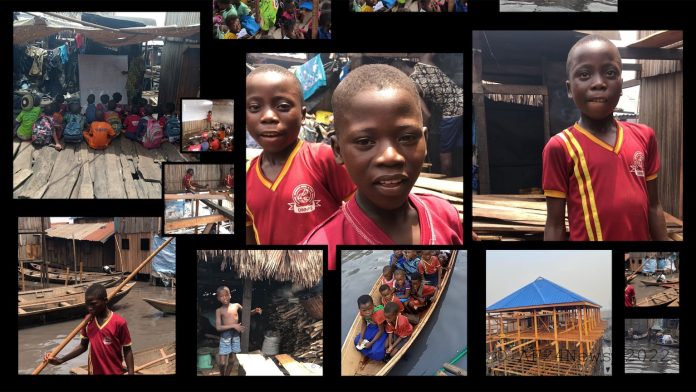With Nigeria recognised as the world capital of out of school children, WISDOM DEJI-FOLUTILE writes about a young man’s ingenious efforts to bring free education to a poor riverine community in Lagos.
When most people think about problems confronting Nigeria’s education sector, they talk about dilapidated structures, lack of infrastructure, and pupils probably sitting on blocks and the floor.
But as bad as these conditions are, they are still far a luxury for pupils of Divine Wisdom Nursery and Primary School (now MIPAMAWU Children School), at Makoko, a water-front slum in the centre of Lagos, estimated to be home to around 250,000 people, most of whom live in squalor. For the pupils of Divine Wisdom Nursery and Primary School, the saying, ‘Life is not a bed of roses,’ loudly rings true.
Yes, they may be going to school, but they can’t imagine the basic experiences associated with schooling in the rather posh areas of the city – yards for playing sports, assembly grounds, rides in air-conditioned school buses, among others.
What they have is the long winding dirt path to their dilapidated classrooms, their memories stuck with the pungent smell of fish, a canoe trip to class, cramped rafted structures, and the noise of everyday town buzz drowning out their teachers’ voices.
Although the school sits far from what a conducive learning environment should be like, its development is still one based on the initiative of 22-year-old Wheduto Urban January, who was moved with compassion for the many out-of-school children in the community and decided to set up a place of learning for them.
January set up the school just after finishing his West African Secondary School Certificate Examination.
Canoe ride to school
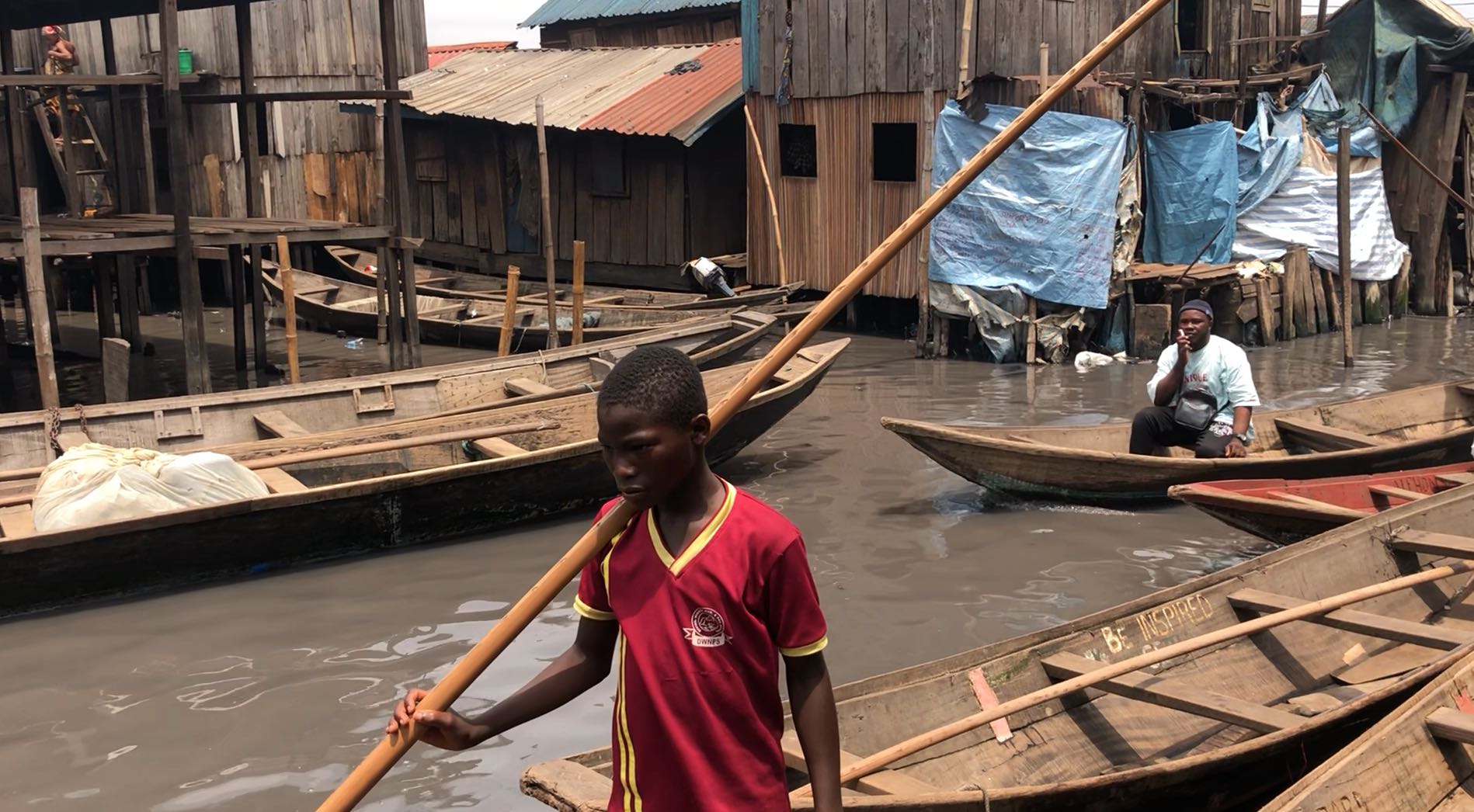
On a warm Tuesday morning in March, our team made our way to Makoko to visit the riverine school. The founder, January, as he would like to be called, greeted us good-naturedly at the rendezvous point. Without question, a very busy man, he gingerly introduced himself to our team and began leading us down a winding path through the community maze, weaving through its nooks and crannies.
We silently made our way through the slummed corners of the settler community and finally arrived at a makeshift jetty crowded with canoes. It was here one would really grasp the experience of what’s life like in a slum. This was a habitation of water-dwellers, who being mostly traders were one and the same with the brackish waters that acted as the foundations of their sprawling community.
Standing at their little port, women, young city-lifers, schoolchildren and more, were mounting and alighting canoes with as much intention and attention as a person in the city would enter and alight an Uber. This was second nature for them.
The people at the port kindly ensured that our team entered the ‘vessels’ in good posture, even making sure that the video team was comfortable bearing their equipment. When we were settled, we started to the school through the narrow, winding waterway.
At first, being without a life jacket or any extensive experience treading water, every manoeuvre felt like it could easily be the end of the world. But for the rest of the community, it was just another day and nothing seemed extraordinary. In fact, the paddler navigating the canoe of our video team could not have been more than 12 years old.
However, the real story here was not the canoe that we rode or that the students ride every day. The real story was the school to which they ride canoes.
On the short journey to the school, I began to understand January’s pontifications on the apparent need for some form of further intervention.
By 11 am, we arrived at the school, where we saw prepubescent children simply going about their business as though they were just tinier members of the working class. January told us that the boat trips usually take an hour, sometimes more, to mobilise the children to school. The school uses five canoes, all of which they used to rent until recently.
Learning a few feet from the water
After a few minutes, we arrived at the school ‘gates’. Actually, the school, obviously having no wicket or turnstile, was just a collection of docked structures, the first being a classroom that stood just around 6 – 8 feet away from the water.
I walked into the classroom and met children sitting cross-legged, barefoot, as the teacher understandably struggled to pull back the students’ attention from the sound of communal chatter to the message of the ongoing lecture. The teacher today, a volunteer from an NGO, was telling the children to repeat the teaching points after her, and most of them did. Although the school teaches the students in the English Language, an interpreter always stands by to repeat the teaching points in native parlance for the students to understand correctly.
No furniture, roofing, teaching aids
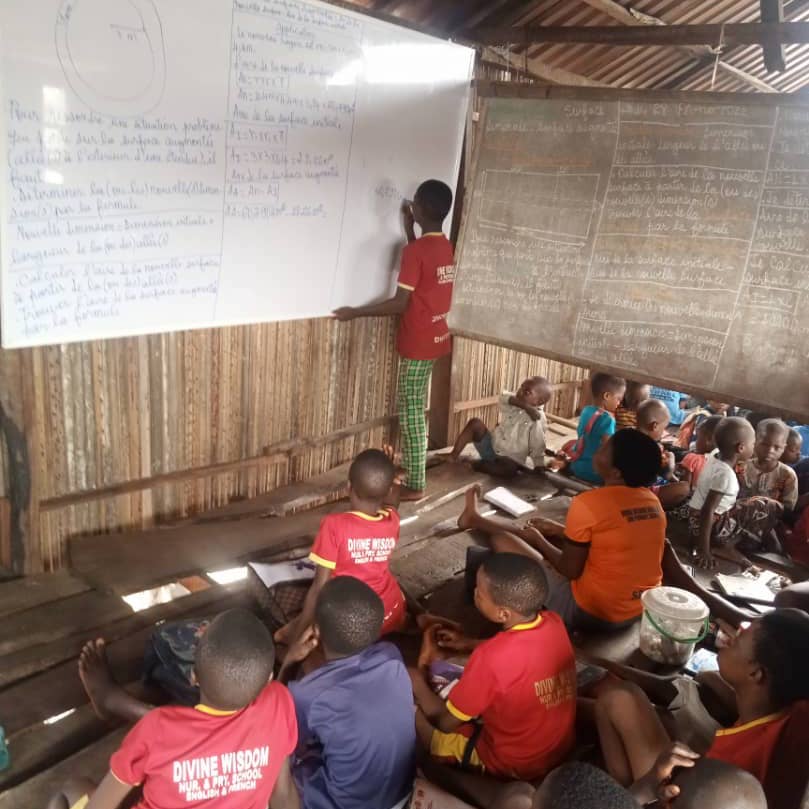
Although a simple eye scan revealed enough shortcomings, we asked January and his team about some pressing issues in the school.
“We don’t really have any teaching materials. Sometimes we use our phones to research the subjects,” January started. He said that the school was also struggling to get teaching staff. Including him, the school has six teachers, but four of them are not collecting any salary.
“Before, we couldn’t get any teachers. But now, we have two teachers. We pay them salary because it’s hard to see anybody to teach for free,” January stated, adding that the teachers on salary collect just N12,000 (US$28) and N15,000 (US$36).
Some of the students could be seen wearing uniforms, but the majority of them did not have uniforms. Most of the other students were barefoot. When asked why this was the case, January, following a recurrent theme, mentioned that it was because of inadequate funding.
“Some of the challenges we have now: our children are sitting on the floor, we need furniture, we need more space. Every Sunday, we go to church to sensitise the public on the importance of education, so we imagine that the number of students will soon increase,” he said.
Another rainy season has come, and the students of the school are greatly affected by the lack of roofing, windows and more, which has made learning extremely difficult.
“In the rainy season, we are normally disturbed because the building is not roofed properly. We still go and pick them with the canoe, using nylons to cover them as we bring them here,” he confirmed.
‘Why I built the school’
January described the school project, which he started in 2019, as a means of “giving orphans and underprivileged children free education.”
“The parents are not educated, so they don’t know the importance of education. All they do is their normal daily trade and go on with their lives. We can’t even cater to all of the out-of-school students in the community. If we had a better school structure, we would be able to pick more students,” he said.
“After sitting for WASSCE, I just started wondering what I could do. I am also a Sunday school teacher in the church, and I’ve always liked teaching children. I called a couple of my friends, and we had a meeting, and I told them, ‘See, our junior brothers are just sitting at home doing nothing. Let us call them together and at least start teaching them the [English] Alphabet,” he added.
According to him, personal funds and donations from the church were the two primary sources of capital for them.
Divine Wisdom Nursery and Primary School runs education for the elementary stages of the children’s education, with the highest class level being Primary 5. Although there seems to be no structured curriculum, the school teaches the students basic school subjects like mathematics, quantitative reasoning and both English and French languages.
Presently, January said the school has enrolled 182 children, stressing that the waterfront community meant that pupils are transported using canoes.
Support from church, schools, NGOs
According to January, the school has been receiving some support from the community’s local church and some other NGOs since its inception.
In early March, the Concerned Parents and Educators Network (CPE), led by educationist and CEO of Edumark Consult, Mrs Yinka Ogunde, contributed to helping Divine Wisdom school to procure two canoes to transport the pupils to and fro school.
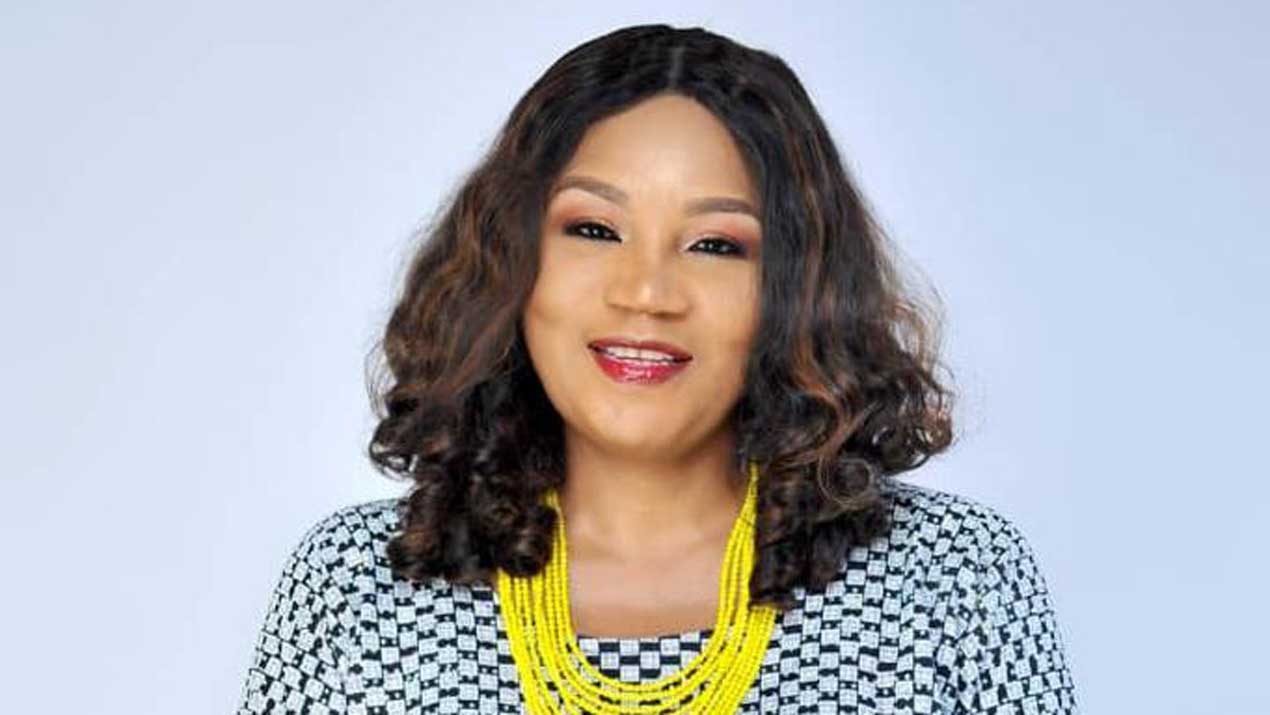
“We have never had any government help. They have never been here. I normally post information about the school on social media. When I was posting in some of those groups, I got information about the Concerned Parents and Educators Network,” January said.
He added that the network had also been helping with renovating the school alongside adding a few other classroom blocks. January also mentioned receiving support in terms of donations of teaching materials from schools like Le Poshe School.
Ogunde said that although the CPE was originally created to table discussions only, she soon discovered that the cracks in Nigeria’s education system seemed too large to be patched with only dialogue.
She said their intervention in Divine Wisdom school was primarily regarding the school’s infrastructure. The CPE is also planning to provide the waterfront school with full-time teachers, she said.
“We are collaborating with an international school to improve the quality of teaching. The school will be providing two or three schoolteachers that will go there every day. We will also provide seats for the school,” Ogunde said.
“The problem in the education sector is overwhelming. Our own is just to do interventions. The government is the one that can bear major expenses to build a better structure for the students,” she added.
Asked how he is able to foot other expenses of the school, January said he sells firewood with his mother after school every day. “My partner here is also a pastor, so he receives some donations from his church for the school,” he said.
Speaking about plans for his future, the SSCE certificate holder said although he would like the school to continue its operation, he plans to return to school when the opportunity comes.
“I want to study law and be able to support my mother. I already have my results, and all I am looking for now is the opportunity and resources to further my studies,” he said.
Lagos government speaks
The Assistant Director, Public Affairs at the Lagos State Ministry of Education, Ganiu Lawal, told our correspondent that the government is aware of the situation with riverine communities and that they “are not left out.”
“The riverine communities in Lagos State are not left out in terms of provision of infrastructure, especially in the education sector. There is no area close to the waterside in Lagos that is devoid of a public school, the schools are not on the water but they are close enough to the communities,” he said.
When told that one of the reasons why parents shun areas beyond the waterfront was security, Lawal said that the state government is aware of the concerns and is in the process of “exploring other options of bringing schools closer to the children in the riverine areas.”
He said although the state government appreciates volunteer work, stakeholders should advocate for public schooling.
Meanwhile, the official said that there are laid-out guidelines regarding the establishment of schools and that the poor conditions of Divine Wisdom school would mean that the facility would fail approval tests.
‘Divine Wisdom school is a reflection of government’s failure’
Mr Taiwo Akinlami, a lawyer and UNICEF child rights advocate, told our correspondent that January’s efforts are commendable and that the infrastructural shortcomings of the makeshift school are a reflection of the government’s failure.
“It is a failure of the state (government). The welfare and the security of the people should be the primary aim of the government. You cannot blame Divine Wisdom school and its founders. They are trying to solve a problem the best way they can out of their humanitarian principle.
“The environment and infrastructural failure present in the school is a reflection of the abandonment of the government. We must salute that young man for establishing that school in his community. Leaving school, he could have chosen to do anything else,” he said.
Akinlami cited the example of Efren Geronimo Peñaflorida, a Filipino teacher and development worker who offered out-of-school Filipino children an alternative to street gangs through education. Peñaflorida, known for recreating school settings in unconventional locations such as cemeteries and trash dumps, was recognised in 2009 as the CNN Hero of the Year by CNN’s Blue Ribbon Panel.
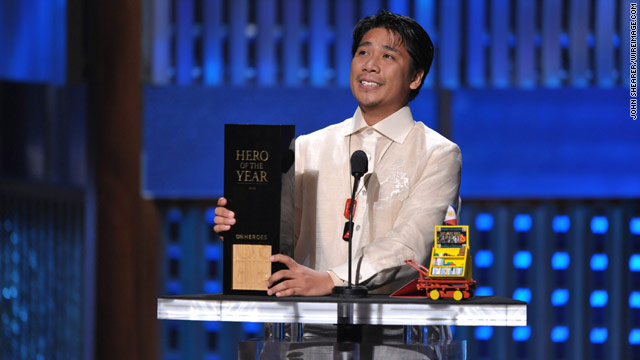
The lawyer said that January’s efforts should be seen as commendable, and also called out the government for their unwillingness to “taste the stew they are cooking”, as evident in the rejection of the “Bill for an Act to Regulate International Studies for Wards and Children of Nigerian Public Officers, to Strengthen Indigenous Institutions, Provide Efficient Educational Services for National Development; and for Related Matters”.
The Bill, sponsored by a member of the House, Honorable Sergius Ogun, aimed to ensure the wards of government officials are educated in Nigeria and not abroad. It failed to pass the first reading at the House of Representatives on March 3, 2022.
“I’ve never seen a place where the person cooking stew is afraid of tasting it—it means you are not sure what you put inside. The political class doesn’t want to taste the food they are cooking. That is why they cannot be responsible,” Akinlami said.
Troubling statistics
According to a 2015 report by the World Bank Group, Private schools are currently educating the majority of primary and secondary school students in Lagos State, Nigeria. The report stated that Lagos State has one of the largest markets for private basic education services in the world.
It is not hard to see why, as in August 2021, Premium Times reported after an investigative tour that public schools in the state are poorly maintained, with some of them lacking perimeter fencing, security gates and trained security personnel, alongside dilapidated infrastructure. This rings true to some fears that January mentioned about community dwellers’ trepidations about security.
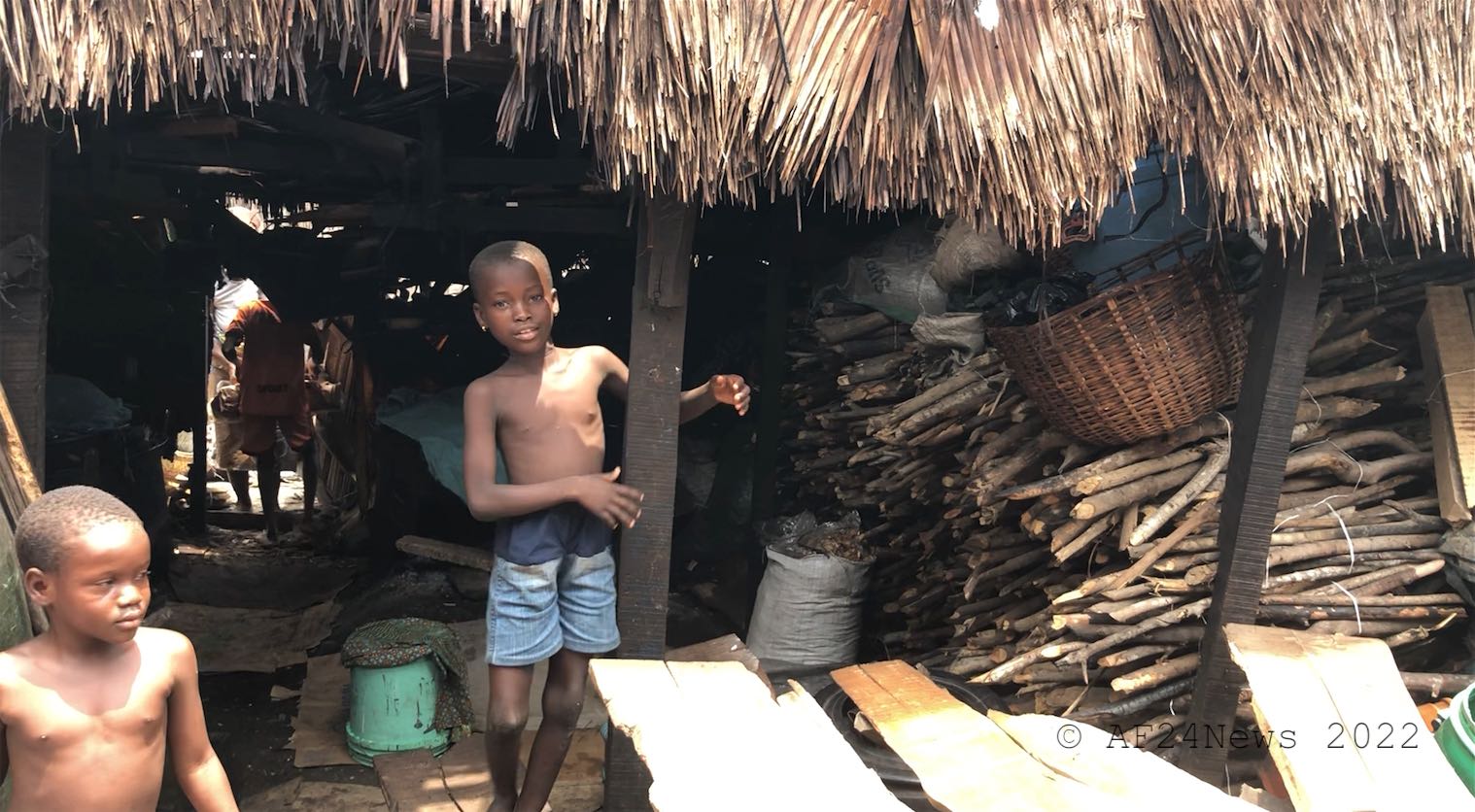
The United Nations Children Fund (UNICEF) has also said that 10.5 million children are out of school in Nigeria, which is the highest rate in the world.
The UNICEF Representative in Nigeria, Peter Hawkins, reiterated this in a statement while commemorating the International Day of Education.
“10.5 million children are out of school in Nigeria, which is the highest rate in the world. The figure indicates that one-third of Nigerian children are not in school, and one in five out-of-school children in the world is a Nigerian,” he had said in January.
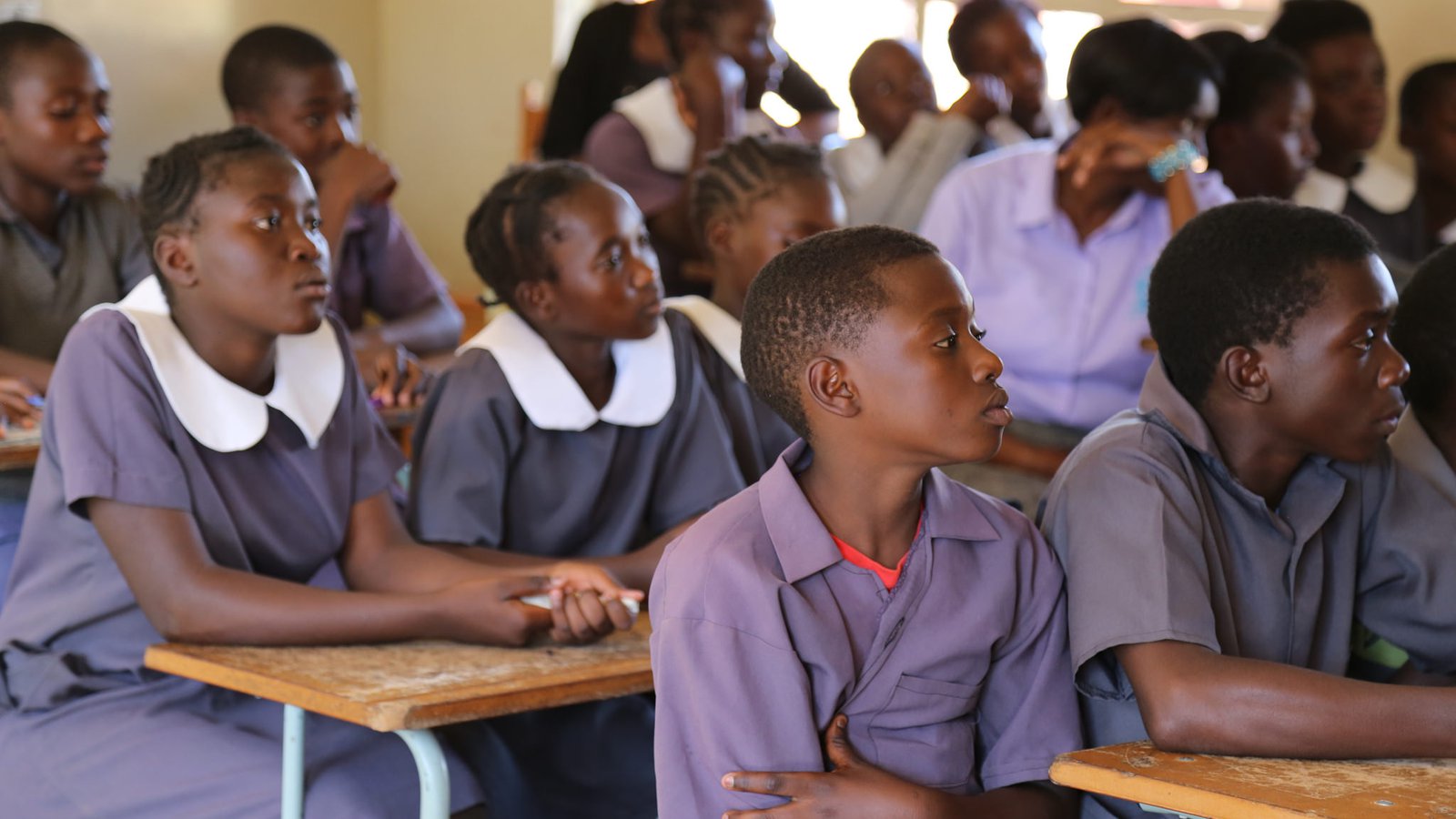
The United Nations Member States had in 2015 announced the Sustainable Development Goals (SDGs) as a universal call to action to end poverty and ensure peace and prosperity among all peoples by 2030.
Sustainable Development Goal 4 (SDG 4) is the education goal. It aims to “ensure inclusive and equitable quality education and promote lifelong learning opportunities for all.”
According to the UN, “Sub-Saharan Africa faces the biggest challenges in providing schools with basic resources. The situation is extreme at the primary and lower secondary levels, where less than one-half of schools have access to drinking water, electricity, computers and the Internet.”
Less than 8 per cent of Nigeria’s N17Tn 2022 budget was allocated to the Education sector. While this is an uptick from the 5.7 per cent allocated in 2021, it still falls short of the international recommended benchmark of 15-20 per cent.
*UPDATE: Divine Wisdom Nursery and Primary School is now a registered institution. The school name was changed to MIPAMAWU CHILDREN SCHOOL.






